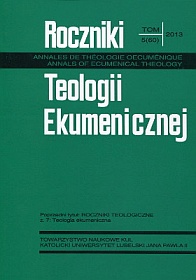Czy istnieje możliwość opracowania antropologii wspólnej dla wszystkich chrześcijan?
Abstrakt
The purpose of this article is to give the evidence that the anthropology of imago Dei could be considered as the groundwork for the common anthropology valid for the whole Christianity and it also depicts the vision of man as the answer to the demands of every human being of the postmodernism epoch.
The starting point of our reflection is the fact of the return of the interest in anthropology in the 20th century among the theologians of the three great Christian denominations: Orthodox, Protestant and Catholic. When in the 20th century the ecumenical movement appeared, theological anthropology, which both joins and divides Churches, became very crucial and still it is getting more and more important. After many years of ecumenical dialogues we can affirm that, despite the differences, all Christians understand man as a imago Dei – the image of God. He was not only created as such, but has always been, despite the original sin. Man is the image of God One in the Holy Trinity who lives in mutual relations, that is why human being is also highly relational. He lives in the relation with God, with another human being, and with the created world over which he was appointed as the master and manager. All Christian Churches which took part in the ecumenical dialogue agree that the source of this anthropology is the Bible; they will also agree about the original sin and his consequences for the human nature considered in the light of Jesus Christ; finally, they will agree on imago Dei as the foundation of the personal dignity of man. There are still differences, the questions that require more theological work, for example distinction between image and likeness; the concept of theosis – deification present in the orthodox theology and considered as problematic by the protestant theology; the Churches teaching about the ordination of women and homosexuality.
At the end of the article we have some examples of the perspectives that give the anthropology of the image of God. This concept of human can help to overcome the contemporary crisis of anthropology, the result of the postmodernism. This anthropology also claims that all Christian Churches are able to give the common answer to the ethics questions such as abortion, euthanasia or genetic manipulations. The author also suggests that all Christian Churches, as the starting point and foundation, should take not only the Bible, but the anthropology of the Fathers of Church as well.
Bibliografia
Bujak J.: Człowiek jako imago Dei. Wokół antropologicznych treści w wybranych dokumentach dialogów doktrynalnych. Szczecin 2007.
Bujak J.: Usprawiedliwienie przez wiarę i przebóstwienie w dialogu teologicznym pomiędzy Kościołem Ewangelicko-Augsburskim Finlandii i Patriarchatem Moskiewskim. „Ateneum Kapłańskie” 2008 t. 1 s. 75-89.
Flick M., Alszeghy Z.: Antropologia. W: Nuovo Dizionario di Teologia. Red. G. Barbaglio, S. Dianich. Cinisello Balsamo (Milano) 1988 s. 24-40.
Flick M., Alszeghy Z.: Fondamenti di una antropologia teologica. Firenze 1982.
Hall D.J.: Être image de Dieu. Le stewardship de l’humain dans la création. Paris 1998.
Heyer F.: Orthodoxe Anthropologie der Gegenwart in der Sicht eines evangelischen Theologen. W: Das Bild vom Menschen in Orthodoxie und Protestantismus. Drittes Theologisches Gespräch zwischen dem Ökumenischen Patriarchat und der Evangelischen Kirche in Deutschland vom 2 bis 5. Oktober 1973 in Chambésy/Schweiz. Hrsg. von Kirchlich Außenamt. Stuttgart 1974 s. 31-43.
Horujy S.S.: Christian Anthropology and Eastern-Orthodox (Hesychast) Ascetism. http://www.orthodox.cn/catechesis/horujy/2_en.htm
Hryniewicz W.: Współczesna antropologia prawosławna. „Analecta Cracoviensia” 4:1972 s. 217-238.
Huber W.: Grußwort bei der öffentlichen Vorstellung der Ergebnisse des Studienprojektes Grund und Gegenstand des Glaubens nach römisch-katholischer und evangelisch-lutherischer Lehre in Tübingen, 07. April 2008, http://www.ekd.de/vortraege/ 080407_huber_ tuebingen.html
Klein J.L.: L’homme comme image de Dieu. „Positions luthériennes” 44:1996 s. 144-152.
Ladaria L.F.: Antropologia cristiana. W: Dizionario di teologia fondamentale. Red. R. Latourelle, R. Fisichella, Assisi 1990, s. 49-56.
Laudazi C.: L’uomo nel progetto di Dio. W: Antropologia cristiana. Bibbia, teologia, cultura. Red. B. Moriconi. Roma 2001 s. 261-333.
Mondin B.: L’uomo secondo il disegno di Dio. Trattato di antropologia teologica. Bologna 1992.
Paprocki H.: Obietnica Ojca. Doświadczenie Ducha Świętego w Kościele Prawosławnym. Bydgoszcz 2001.
Paweł VI: Deklaracja o dopuszczeniu kobiet do kapłaństwa urzędowego Inter insignores. W: W trosce o pełnię wiary. Dokumenty Kongregacji Nauki Wiary 1966-1994. Tarnów 1995 s. 110-122.
Sanna I.: L’antropologia cristiana tra modernità e postmodernità. Brescia 2004.
Sanna I.: L’identità aperta. Il cristiano e la questione antropologica. Brescia 2006.
Sesboüé B.: Analyse catholique. W: Comité mixte catholique-protestant en France. Consensus oecuménique et différence fondamentale. Paris 1987 s. 45-82.
Worthing M.: The Imago Dei in the Lutheran Tradition. W: Theological Anthropology. A collection of papers prepared by Faith and Unity Commissioners of the National Council of Churches in Australia, 14-16. www.ncca.org.au/__data/page/104/Anthropology_Study.pdf

